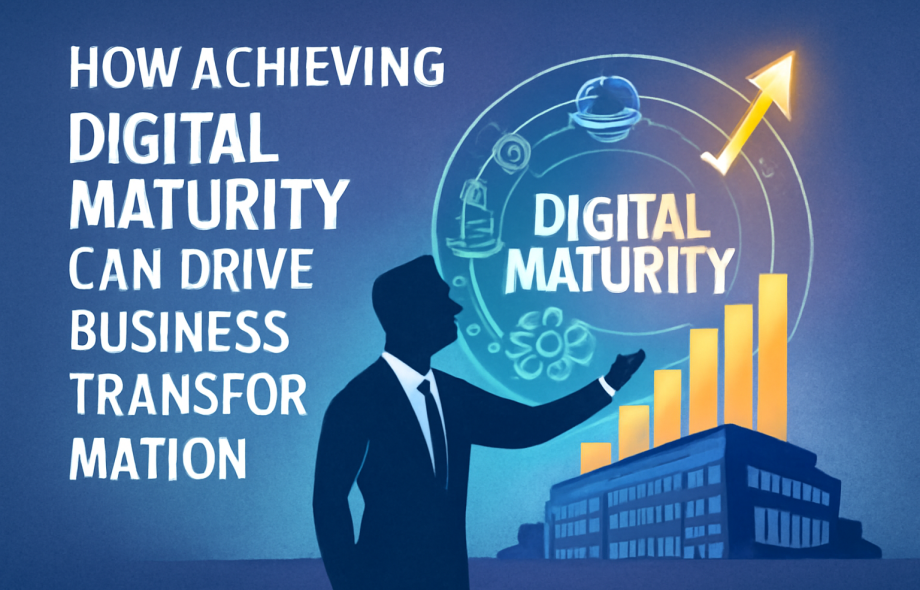Staying competitive means constantly evolving and adopting new technologies. Digital maturity refers to an organization’s ability to effectively leverage digital technologies and integrate them into its operations, culture, and strategy. Achieving digital maturity is no longer just an option; it’s a necessity for companies that want to remain competitive and thrive in the modern business landscape.
Digital maturity goes beyond just adopting new tools or platforms. It encompasses a comprehensive transformation of how a business operates, makes decisions, and serves its customers. In this blog, we’ll explore how achieving digital maturity can drive business transformation and help companies unlock new growth opportunities.
Why Digital Maturity Is Crucial for Business Transformation
1. Streamlining Operations and Improving Efficiency
One of the most immediate benefits of achieving digital maturity is the ability to streamline business operations. Digital tools, such as cloud-based solutions, automation software, and data analytics platforms, can help organizations optimize their processes, reduce manual workloads, and improve the speed and accuracy of decision-making.
For example, by adopting cloud-based systems, businesses can centralize their operations, improve collaboration between departments, reduce silos, and allow employees to access critical data and tools from anywhere. Similarly, automation software can handle repetitive tasks, freeing up employees to focus on higher-value work and improving overall efficiency.
By integrating the right digital tools, businesses can eliminate bottlenecks, improve communication, and achieve greater operational efficiency all of which contribute to business transformation.
2. Driving Innovation and Competitive Advantage
Achieving digital maturity enables businesses to drive innovation in their products, services, and processes. Digital tools allow companies to experiment with new ideas, create new business models, and find more efficient ways to meet customer needs.
For example, businesses that embrace artificial intelligence (AI) and machine learning (ML) can use these technologies to create smarter products and services. AI-driven chatbots can enhance customer service by providing real-time assistance, while machine learning algorithms can help predict customer behavior, optimize marketing strategies, and improve product recommendations.
The ability to innovate and adapt quickly to changing market conditions gives businesses a competitive edge and ensures they stay relevant in the ever-evolving digital landscape.
3. Enhancing Customer Experience and Engagement
One of the most significant ways that digital maturity drives business transformation is by improving the customer experience. Customers today expect seamless, personalized experiences across digital channels, whether it’s through websites, mobile apps, or social media platforms.
Achieving digital maturity enables businesses to create customer-centric strategies, using digital tools to understand customer preferences, behaviors, and needs. By analyzing customer data, businesses can offer more personalized experiences, tailored recommendations, and proactive support. This not only improves customer satisfaction but also increases customer loyalty and retention.
Moreover, digital maturity allows businesses to provide omni-channel experiences, ensuring that customers can interact with the brand in the way that suits them best, whether it’s online, in-person, or via mobile devices.
4. Enabling Data-Driven Decision-Making
Data is one of the most valuable assets for businesses today. Digital maturity enables organizations to collect, analyze, and leverage data to make more informed decisions. With the right tools in place, businesses can gain insights into customer preferences, market trends, operational efficiency, and financial performance—all of which can guide strategic decision-making.
For example, businesses that adopt data analytics platforms can track real-time performance metrics, spot inefficiencies, and make adjustments quickly. They can also use data to forecast trends, identify new opportunities, and minimize risks. With data-driven insights, businesses can make smarter, more strategic decisions that drive long-term growth.
5. Fostering Agility and Adaptability
In today’s volatile business environment, agility is essential for survival. Digital maturity empowers businesses to be more agile and responsive to changes in the market, customer behavior, or technology. By embracing digital tools that enable quick decision-making, collaboration, and adaptation, businesses can pivot quickly and take advantage of emerging opportunities.
Whether it’s shifting business models, adjusting marketing strategies, or responding to customer feedback, digital maturity enables businesses to remain flexible and resilient in the face of change.
How to Achieve Digital Maturity
Achieving digital maturity requires a combination of strategy, technology, and culture. Here are a few steps that businesses can take to start their journey towards digital maturity:
- Invest in the right technology: Choose digital tools that align with business goals, whether it’s cloud computing, AI, or customer relationship management (CRM) software.
- Foster a digital-first culture: Encourage a mindset of innovation and adaptability at all levels of the organization.
- Leverage data: Invest in data analytics tools to gain insights and drive decision-making.
- Develop an agile strategy: Embrace flexibility in your business operations, allowing you to adapt quickly to market shifts and customer demands.
- Prioritize customer experience: Use digital tools to better understand customer needs and create personalized, seamless experiences across channels.
The Future of Digital Maturity in Business Transformation
As technology continues to evolve, the concept of digital maturity will become even more integral to business transformation. The integration of AI, 5G, and blockchain technology, along with the growing importance of cybersecurity and data privacy, will shape the future of digital transformation.
Businesses that continue to embrace and build upon digital maturity will be better equipped to innovate, compete, and thrive in the digital era. The journey towards digital maturity may be challenging, but the rewards improved efficiency, increased profitability, and enhanced customer experiences make it well worth the investment.
Conclusion
Digital maturity is not just about adopting the latest technologies, it’s about embedding digital capabilities into the fabric of your business to drive growth, enhance customer experiences, and stay competitive. Achieving digital maturity allows businesses to streamline operations, improve efficiency, and foster innovation, all of which are essential for driving transformation.
The path to digital maturity may not always be easy, but the rewards are immense. Organizations that commit to becoming digitally mature will experience long-term success, improved market positioning, and a more agile approach to business.
 :
https://www.pinterest.com/
:
https://www.pinterest.com/

